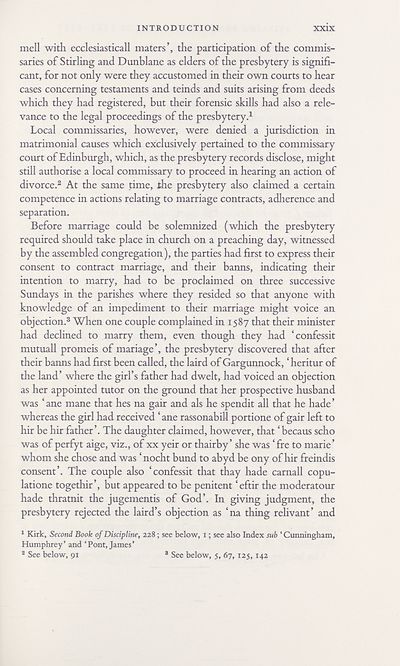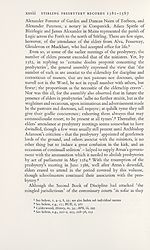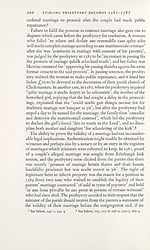Series 4 > Stirling Presbytery Records 1581-1587
(34) Page xxix
Download files
Complete book:
Individual page:
Thumbnail gallery: Grid view | List view

INTRODUCTION
XXIX
mell with ecclesiasticall maters’, the participation of the commis¬
saries of Stirling and Dunblane as elders of the presbytery is signifi¬
cant, for not only were they accustomed in their own courts to hear
cases concerning testaments and teinds and suits arising from deeds
which they had registered, but their forensic skills had also a rele¬
vance to the legal proceedings of the presbytery.1
Local commissaries, however, were denied a jurisdiction in
matrimonial causes which exclusively pertained to the commissary
court of Edinburgh, which, as the presbytery records disclose, might
still authorise a local commissary to proceed in hearing an action of
divorce.2 At the same time, the presbytery also claimed a certain
competence in actions relating to marriage contracts, adherence and
separation.
Before marriage could be solemnized (which the presbytery
required should take place in church on a preaching day, witnessed
by the assembled congregation), the parties had first to express their
consent to contract marriage, and their banns, indicating their
intention to marry, had to be proclaimed on three successive
Sundays in the parishes where they resided so that anyone with
knowledge of an impediment to their marriage might voice an
objection.3 When one couple complained in 1587 that their minister
had declined to marry them, even though they had ‘confessit
mutuall promeis of mariage’, the presbytery discovered that after
their banns had first been called, the laird of Gargunnock, ‘ heritur of
the land’ where the girl’s father had dwelt, had voiced an objection
as her appointed tutor on the ground that her prospective husband
was ‘ ane mane that hes na gair and als he spendit all that he hade ’
whereas the girl had received ‘ ane rassonabill portione of gair left to
hir be hir father’. The daughter claimed, however, that ‘becaus scho
was of perfyt aige, viz., of xx yeir or thairby’ she was ‘fre to marie’
whom she chose and was ‘nocht bund to abyd be ony of hir freindis
consent’. The couple also ‘confessit that thay hade carnall copu-
latione togethir’, but appeared to be penitent ‘eftir the moderatour
hade thratnit the jugementis of God’. In giving judgment, the
presbytery rejected the laird’s objection as ‘na thing relivant’ and
1 Kirk, Second Book of Discipline, 228; see below, 1; see also Index sub ‘ Cunningham,
Humphrey’ and ‘Pont,James’
a See below, 91 * See below, 5, 67, 125, 142
XXIX
mell with ecclesiasticall maters’, the participation of the commis¬
saries of Stirling and Dunblane as elders of the presbytery is signifi¬
cant, for not only were they accustomed in their own courts to hear
cases concerning testaments and teinds and suits arising from deeds
which they had registered, but their forensic skills had also a rele¬
vance to the legal proceedings of the presbytery.1
Local commissaries, however, were denied a jurisdiction in
matrimonial causes which exclusively pertained to the commissary
court of Edinburgh, which, as the presbytery records disclose, might
still authorise a local commissary to proceed in hearing an action of
divorce.2 At the same time, the presbytery also claimed a certain
competence in actions relating to marriage contracts, adherence and
separation.
Before marriage could be solemnized (which the presbytery
required should take place in church on a preaching day, witnessed
by the assembled congregation), the parties had first to express their
consent to contract marriage, and their banns, indicating their
intention to marry, had to be proclaimed on three successive
Sundays in the parishes where they resided so that anyone with
knowledge of an impediment to their marriage might voice an
objection.3 When one couple complained in 1587 that their minister
had declined to marry them, even though they had ‘confessit
mutuall promeis of mariage’, the presbytery discovered that after
their banns had first been called, the laird of Gargunnock, ‘ heritur of
the land’ where the girl’s father had dwelt, had voiced an objection
as her appointed tutor on the ground that her prospective husband
was ‘ ane mane that hes na gair and als he spendit all that he hade ’
whereas the girl had received ‘ ane rassonabill portione of gair left to
hir be hir father’. The daughter claimed, however, that ‘becaus scho
was of perfyt aige, viz., of xx yeir or thairby’ she was ‘fre to marie’
whom she chose and was ‘nocht bund to abyd be ony of hir freindis
consent’. The couple also ‘confessit that thay hade carnall copu-
latione togethir’, but appeared to be penitent ‘eftir the moderatour
hade thratnit the jugementis of God’. In giving judgment, the
presbytery rejected the laird’s objection as ‘na thing relivant’ and
1 Kirk, Second Book of Discipline, 228; see below, 1; see also Index sub ‘ Cunningham,
Humphrey’ and ‘Pont,James’
a See below, 91 * See below, 5, 67, 125, 142
Set display mode to:
![]() Universal Viewer |
Universal Viewer | ![]() Mirador |
Large image | Transcription
Mirador |
Large image | Transcription
Images and transcriptions on this page, including medium image downloads, may be used under the Creative Commons Attribution 4.0 International Licence unless otherwise stated. ![]()
| Scottish History Society volumes > Series 4 > Stirling Presbytery Records 1581-1587 > (34) Page xxix |
|---|
| Permanent URL | https://digital.nls.uk/126646563 |
|---|
| Description | Over 180 volumes, published by the Scottish History Society, containing original sources on Scotland's history and people. With a wide range of subjects, the books collectively cover all periods from the 12th to 20th centuries, and reflect changing trends in Scottish history. Sources are accompanied by scholarly interpretation, references and bibliographies. Volumes are usually published annually, and more digitised volumes will be added as they become available. |
|---|


